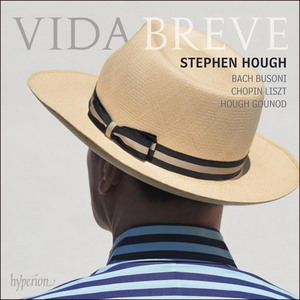Stephen Hough's Album 'Vida Breve' To Be Released By Hyperion Records
The recording is released on Friday, January 29.

"In the world of the arts," says Stephen Hough, "death has always been a central subject resulting in the most exalted and inexhaustible expression," and the pianist's upcoming solo album explores some pieces that have this theme as part of their identity or inspiration. Among these works is Mr. Hough's own Piano Sonata No. 4 ("Vida breve"), after which the album is titled.
He also performs Chopin's Piano Sonata No. 2 ("Funeral March"), Liszt's Funérailles and Bagatelle sans tonalite, Busoni's Kammer-Fantasie über Carmen and transcription of Bach's Chaconne in D minor, and his own arrangements of the traditional Korean song Arirang and Gounod's Méditation sur le premier prélude de piano de J.S. Bach 'Ave Maria.'
The recording is released on Friday, January 29, by Hyperion Records, for which Mr. Hough has recorded more than 60 albums. Pre-orders are currently available from Apple Music and Amazon.com. For more information, visit Hyperion-Records.co.uk.
Mr. Hough's Piano Sonata No. 4 ("Vida breve") was commissioned as part of the Gilmore Young Artist program and premiered by the composer at Atlanta's Spivey Hall on November 10, 2018. As suggested by the subtitle "vida breve," the work is a reflection upon the shortness of life.
Apropos this and the additional repertoire chosen for the album, Mr. Hough said:
"Chopin's 'Funeral march' sonata and Liszt's Funérailles speak for themselves-and that the latter was written in the same month as the Polish composer's death may or may not have been an accident. Bach's Chaconne, apparently written in memory of his first wife, is here expanded by Busoni from the small wooden box of its original solo violin into a towering cathedral of sound. The same Italian composer's artful reworking of music from Bizet's opera Carmen is a very different kind of transcription, more a transfiguration depicting the calamity of death by murder at the broken close of a tragic life. My own fourth piano sonata takes a more abstract if still melancholy inspiration from such ideas: life's brevity, a 'sonata' that ends sooner than expected. And in Liszt's Bagatelle sans tonalité we face the Devil himself-the cause of death and its terrors in traditional Christian devotion: the final fear for the final hour.
Death: the only certainty in every life, the final piece on everyone's recital programme. Ah, but what about the encores? On this recording there are two gentle arrangements of mine by way of consolation: the famous Korean song Arirang (over 600 years old and existing in more than sixty versions), and Gounod's recasting of Bach's first prelude from the 'forty-eight', originally for violin alone and called Méditation, but later further transformed by adding the words of the prayer Ave Maria."
Mr. Hough's previous recording for Hyperion Records was a three-disc box set of Beethoven's complete piano concertos, recorded with the Finnish Radio Symphony Orchestra under Chief Conductor Hannu Lintu. The widely acclaimed collection, released last year in celebration of Beethoven's 250th birthday, was a BBC Radio 3 "Record of the Week" and is one of The Sunday Times (U.K.)'s "Records of the Year." Mr. Hough recorded his first two piano sonatas for BIS Records and Hyperion Records, respectively, and his third piano sonata may be heard here.
Over the course of his career, Stephen Hough has not only secured a reputation as an insightful pianist, but also as a writer and composer. In 2001, he was the first classical performing artist to receive a MacArthur Foundation Fellowship and, in 2013, he was named a Commander of the British Empire. On June 1, 2020, he re-opened Wigmore Hall, performing the UK's first live classical music concert in a major venue since the nationwide lockdown in March. Later that summer he made his 29th appearance at the BBC Proms performing Beethoven's Piano Concerto No.2 with BBC Scottish Symphony Orchestra. He has appeared with most of the major American and European orchestras and plays recitals regularly in major halls and concert series around the world.
His recordings have garnered international prizes including the Deutscher Schallplattenpreis, Diapason d'Or, Monde de la Musique, several Grammy nominations, and eight Gramophone Magazine Awards including the 1996 and 2003 "Record of the Year" Awards and the 2008 "Gold Disc" Award. Mr. Hough has composed music for orchestra, choir, chamber ensemble, and solo piano, and his compositions are published by Josef Weinberger, Ltd. He is also an avid painter whose work has been exhibited at the Broadbent Gallery in London.
A noted writer, Mr. Hough is the author of the recent essay collection Rough Ideas: Reflections on Music and More, published by Faber & Faber (U.K.) and Farrar, Straus and Giroux (U.S.) and named winner of the 2020 Royal Philharmonic Society Award. He has written for The New York Times, The Guardian, The Times (U.K.), Evening Standard, The Tablet, Gramophone, and BBC Music Magazine. His novel, The Final Retreat, was published by Sylph Editions in 2018.
Mr. Hough resides in London and is a visiting professor at the Royal Academy of Music in London and The Juilliard School in New York. He holds the International Chair of Piano Studies at his alma mater, the Royal Northern College in Manchester.
To learn more about Stephen Hough, visit stephenhough.com and follow him at @houghhough on Twitter and Facebook.
Comments
Videos

